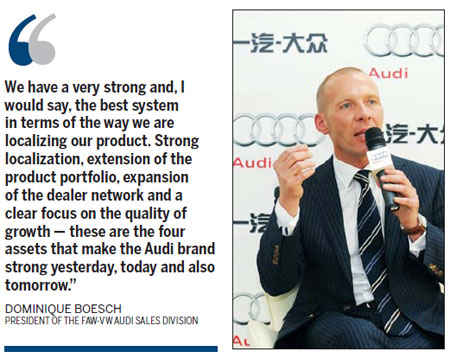FAW-VW tightens grip on nation's luxury market
Updated: 2012-04-24 08:02
By Han Tianyang (China Daily)
|
||||||||

After reporting record quarterly sales of about 90,000 cars in China, German luxury carmaker Audi said it is confident it can consolidate the leading position it has held in the country's premium car market for the past two decades.
Dominique Boesch, president of the FAW-VW Audi Sales Division at Sino-German joint venture FAW Volkswagen, told China Daily that the company's determination to stay competitive is shown in the "strong and powerful product portfolio" it has brought to the ongoing Beijing Auto Show.
Audi is showcasing 22 models at the biennial exhibition in the capital city this year.
The large-scale display will feature the global debut of the A6L e-tron Concept, the RS Q3 Concept and the Q3 jinlong yufeng. The RS5, the S8, the S7 Sportback and the A4 allroad quattro will be exhibited in Asia for the first time at the show as well.
"We are here with three world premieres and four Asian premieres. I think no other carmaker is showing such a strong commitment to the Chinese market," Boesch said. "We believe and we feel the importance of China as our second home market."
The luxury carmaker from Ingolstadt, Germany became the first foreign manufacturer of premium cars to set up local production in China more than 20 years ago.
A joint venture between Volkswagen, Audi's parent company, and China's FAW Group builds the A4L, the A6L and the Q5, and it is capable of an annual capacity of about 300,000 units.
The joint venture is augmenting capacity at the existing plant in Changchun, Jilin province, and building a new plant in Foshan, Guangdong province, to increase the yearly output of Audi to 700,000 units by 2015.
Best localization
"We have a very strong and, I would say, the best system in terms of the way we are localizing our product, " Boesch said.
The depth of Audi's localization can be partly seen in the advanced technology available on the locally built models, he added.
For an example, he used the all-new A6L, which employs so-called "micro hybrid" technologies, including energy regeneration and automatic start-stop systems.
Boesch noted that the company will invest at least 2 billion euros every year over the next four years in innovative technologies and new models, and a large portion of those investments will flow into China, the company's biggest market.
Audi plans to build more models at local facilities, including the Q3 SUV, which is set to start local production next year in Changchun, and the A3, slated to begin production in the plant that will be opened in Guangdong.
Audi's model of localizing the whole value chain is by far the best in the market, he noted.
In addition to the enhanced local lineup, the company vows to bring all of its products to China by 2015, which will be done largely through imports.
Potential for growth is huge because the company sold 309,888 vehicles in China last year, of which about 80 percent were locally made products and the rest were imported vehicles.
Diversified demand
Later this year, Audi will start exports of the Q3, the RS5 and the A4 allroad quattro to China. These models will join the A5, which entered the Chine market at the beginning this year.
Boesch said the brand intends to offer various product options to meet the increasingly diverse demands of Chinese customers.
"We see there is a clear diversification of the tastes and needs of Chinese consumer. That's why we are here at the Beijing Auto Show with a very large product portfolio covering all these different needs," he said, noting that the company wants to play a leading role in the process of an increasingly rich market.
The year 2012 is just a start, and the company's effort to bring more new models will continue in the years to come, he said.
Boesch also said that Audi will increase its dealerships in China to 300, up from 240 currently.
The company had said previously that it aims to nearly double its dealerships in China to 400 by the end of 2013.
"Strong localization, extension of the product portfolio, expansion of the dealer network and a clear focus on the quality of growth - these are the four assets that make the Audi brand strong yesterday, today and also tomorrow," Boesch said.
Audi sales in China grew 41 percent in the first quarter from the same period. Boesche gave a cautious prediction of a 15 to 20 percent year-on-year growth in the luxury car segment this year without disclosing the company's sales target.
Last year, Audi announced an ambitious target of 1 million vehicles in China from 2011 to 2013.
But at the beginning of this year, the company said the target looked a bit conservative based on its sales performance and momentum, and now it is setting a higher goal.
hantianyang@chinadaily.com.cn

 Relief reaches isolated village
Relief reaches isolated village
 Rainfall poses new threats to quake-hit region
Rainfall poses new threats to quake-hit region
 Funerals begin for Boston bombing victims
Funerals begin for Boston bombing victims
 Quake takeaway from China's Air Force
Quake takeaway from China's Air Force
 Obama celebrates young inventors at science fair
Obama celebrates young inventors at science fair
 Earth Day marked around the world
Earth Day marked around the world
 Volunteer team helping students find sense of normalcy
Volunteer team helping students find sense of normalcy
 Ethnic groups quick to join rescue efforts
Ethnic groups quick to join rescue efforts
Most Viewed
Editor's Picks

|

|

|

|

|

|
Today's Top News
Health new priority for quake zone
Xi meets US top military officer
Japan's boats driven out of Diaoyu
China mulls online shopping legislation
Bird flu death toll rises to 22
Putin appoints new ambassador to China
Japanese ships blocked from Diaoyu Islands
Inspired by Guan, more Chinese pick up golf
US Weekly

|

|






